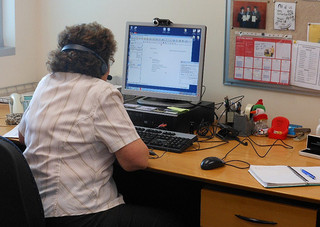If you’ve never had to apply for government assistance such as welfare, food stamps, disability, or unemployment benefits, the world of federal aid might be very foreign to you. But in reality, about half the population of the United States lives in a household where at least one person gets some form of government aid. Many of these people are seniors, veterans, and the very poor, and the number has been on the rise ever since the economic meltdown of 2008. With all the questions in the news about who is abusing the system, you might start to wonder what the government is doing to prevent that abuse. Much of the responsibility falls to trained eligibility workers, who conduct interviews and investigations to see who should get help and how much. It’s not your average government job, but for many people, it’s a fascinating and important area to work in.
1. Screening Applicants
 When someone applies for welfare or food stamps, they typically have a preliminary interview with a case worker, usually the very same day. The eligibility worker needs to find out how many children are in an applicant’s household and their ages, what an applicants main source of income is, and how much of that income gets allotted to utility bills and rent every month. Usually, it’s just a matter of simple math to find out how much aid the applicant is eligible for, based on the state and county standards of how much they earn over the poverty level, minus their bills. The eligibility worker also takes into account medical bills and whether there are disabled people in the home that the applicant is caring for. There are a few obvious things that will greatly reduce or eliminate eligibility for benefits, such as a large savings account, another type of benefits already being received, or a criminal conviction.
When someone applies for welfare or food stamps, they typically have a preliminary interview with a case worker, usually the very same day. The eligibility worker needs to find out how many children are in an applicant’s household and their ages, what an applicants main source of income is, and how much of that income gets allotted to utility bills and rent every month. Usually, it’s just a matter of simple math to find out how much aid the applicant is eligible for, based on the state and county standards of how much they earn over the poverty level, minus their bills. The eligibility worker also takes into account medical bills and whether there are disabled people in the home that the applicant is caring for. There are a few obvious things that will greatly reduce or eliminate eligibility for benefits, such as a large savings account, another type of benefits already being received, or a criminal conviction.
2. Dealing with Different Kinds of People
Eligibility workers usually have a background in public administration or social services, which means they get satisfaction from helping others. Any time you are working with extremely poor or disabled people, you will experience some heartbreaking stories, and for eligibility workers it can be even worse. Having to tell someone they don’t qualify for aid, even if the worker themselves thinks they deserve it, is always difficult. On the flip side of that, eligibility workers have to be diligent. They are always on the lookout for holes in people’s stories, inconsistencies in paperwork, and other signs that an applicant is abusing the system. To work in eligibility, you often have to be shrewd and know when somebody is lying. Even after an applicant is approved for benefits, the worker continues to follow up with them to make sure their eligibility remains the same.
3. Investigating Fraud
In the case of welfare, counties usually employ welfare fraud investigators, who get most of their tips directly from eligibility workers. Welfare fraud is a crime and is investigated as such, and the eligibility worker is usually directly involved in that. They supply records of a welfare recipient’s history, conduct further interviews, and even accompany investigators to the welfare recipient’s home for a home visit. Catching people in the act of abusing the system can be hard, but most social services professionals are motivated by seeing that money go into the hands of families who really need it.
Eligibility workers have an important role – after all, aid could never reach all the people it should without trained professionals making sure it’s being spent wisely. Many eligibility workers go on to become social workers or succeed in other public services jobs, but others find their niche in this line of work. It’s rewarding to help people get back on their feet again, just as the whole country does the same.
Jamie Smith is a full-time writer for higher ed blogs and journals nationwide with a focus on online education opportunities. Several schools offer online degrees, including University of San Francisco and Northwestern University.
Photo credit: Facilitating an Online Meeting by mikecogh on flickr
